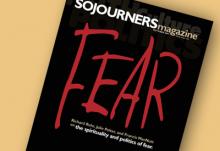How faith and a newspaper transformed a Mississippi community.
Racism
While many in the U.S. civil rights movement were busy integrating lunch counters, others took on an even tougher challenge—integrating U.S. churches.
In Auburn, Alabama, two all-white fraternities wore blackface and Ku Klux Klan robes to Halloween parties; some even simulated a lynching. Both frats have been suspended.
Honky, by Yale sociologist Dalton Conley, is a memoir of growing up during the 1970s and 1980s in the projects of New York's Lower East Side.

A straight-shooting white friend once commented that whenever blacks and whites are together it's like there's a "big pile of poop in the middle of the room..."

The Internet has rekindled the zeal and magnified the power of hate groups. What can we do to fight back?
Tens of millions of people were forcibly taken from their homes in Africa in the 17th and 18th centuries.
Tens of millions of people were forcibly taken from their homes in Africa in the 17th and 18th centuries.
Thirty-five years ago, on June 12, 1963, Medgar Evers was assassinated in front of his home on the west side of Jackson, Mississippi.


